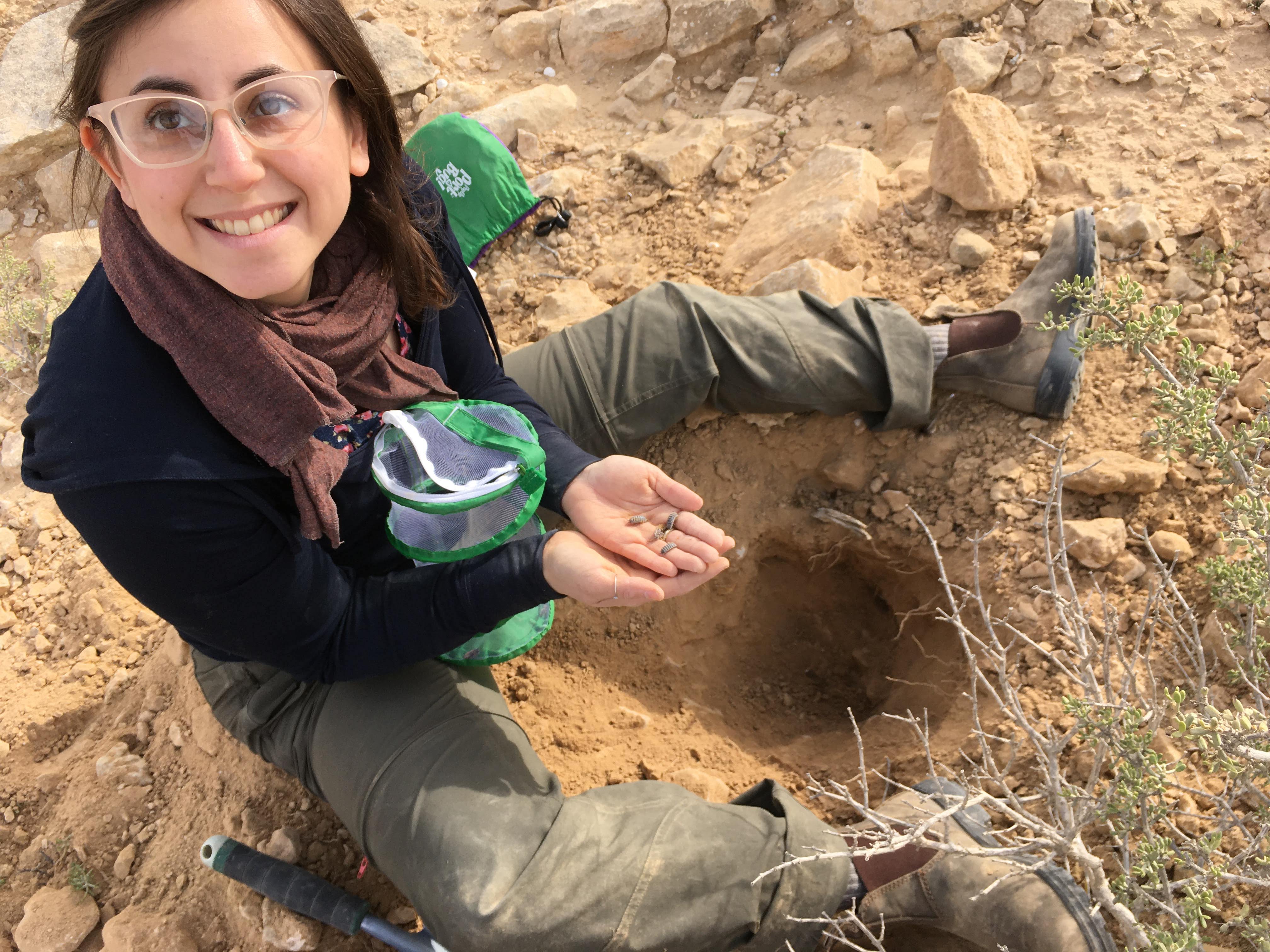Karmi Oxman Stein Fellowship Blog
November 10, 2021
The Stein Fellowship has generously supported me on multiple trips to Israel. During the first trip in the summer of 2019, my advisor Dr. Sean O’Donnell, was the fellowship holder. We collaborated with Dr. Itamar Giladi, professor of desert ecology associated with the Jacob Blaustein Institutes of Desert Research and the Albert Katz International School for Desert Studies of the Ben Gurion University of the Negev. This research expedition focused on thermal ecology of seed harvesting ants and yielded a published manuscript. It was my first research experience as a PhD student.
I’ve been on multiple research trips to Israel, since being awarded the Stein Fellowship myself in 2020. They have all been very fruitful experiences and have provided me with access to one of my favorite places on earth: the Negev Desert. Spending time in deserts is centering. They will humble you with their expanse. For me, I have a deep interest in the micro-communities of the desert. The backbone-less communities that thrive under the soil surface fascinate me.
I am a neuroethologist, meaning that I study the way that brains support behavior. New behaviors arise throughout development. Brains can change, even over the lifetime of an individual, to support these new behaviors. Families are the basic units of most animal societies, but instances of pair-based collaborative parental care are rare. Parental care in fish, rodents and primates (humans) leads to changes in brain structure and function. Will similar patterns in brain plasticity hold in arthropods?
For my PhD research, I use a social isopod to study the relationship between brains and parental behavior. Terrestrial isopods are also known as roley polies, pill bugs, or potato bugs, which roll up into a ball when you unearth them from your garden. The species that I work with, Hemilepistus reaumuri, is found in a select few super-arid locations. One of these places is the Negev Desert. They live in family burrows that they dig into the sand. Subterranean dwellings protect them from desiccation in the harsh desert climate.
H. reaumuri choose one mate for life and become monogamous parents. Even more unique for the animal kingdom, is that both parents provide care for their offspring during the first portion of their life. A mother and father duo synchronize their behavior between either guarding the burrow entrance or foraging for food to bring back to their newly emerged offspring.
During my Stein Fellowship supported trips to Israel so far, I have recorded behavioral observations, and collected specimens to bring back to Drexel for brain processing. This has helped me make substantial progress on my PhD work, even in the times of COVID.
Another one of my primary research goals is to form partnerships. We are all hyper-focused on becoming experts on extremely specific research areas, but we will be stronger if we work together! The Stein Fellowship has supported and encouraged me to make multiple new research partnerships:
Dr. Itamar Giladi is a professor of desert ecology associated with the Jacob Blaustein Institutes of Desert Research and the Albert Katz International School for Desert Studies of the Ben Gurion University of the Negev. Our collaboration began in the summer of 2019 when he hosted our lab group for the seed harvesting ant project. He is now a member of my PhD thesis committee, providing guidance and expertise on social behavior in desert invertebrates and desert ecology. He is a wonderful mentor and thoughtful host when I’ve come to the Negev to make specimen collections and behavioral observations!
Dr. Ahmed Nasser is my most recent collaborator. Dr. Nasser is the director of The Interinstitutional Analytical Instrumentation Unit at the Volcani Insitute of Agriculture. I connected with him through associations with the Hebrew University of Jerusalem, Faculty of Agriculture, where I did my MSc in Agroecology. Dr. Nasser helped me to scan several isopod heads using micro-computed tomography (microCT). This technique uses x-rays to create a 3-dimensional image of an object, in this case, an isopod brain.
Dr. Dror Hawlena is a professor at the Hebrew University of Jerusalem. His lab focuses on the functional ecology of food web dynamics. He also works with H. reaumuri. We met and he offered some insight on behavior and species range locations for this isopod.
I go to Israel often to visit family (I am married to an Israeli), but it’s important to me to make my own ties and relationships with the research community in Israel. The Stein Fellowship has allowed me to do this, and I am incredibly grateful for these experiences, and for the advancements that I’ve been able to make with my PhD research!
Photo from the field:

Myself, with isopods that were deep in their burrow in winter.